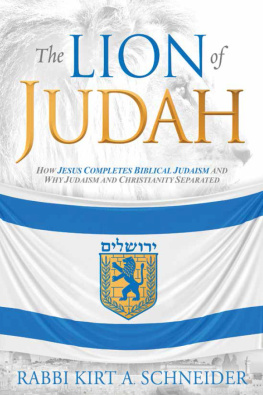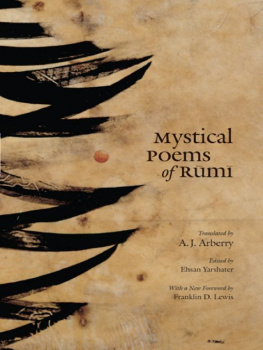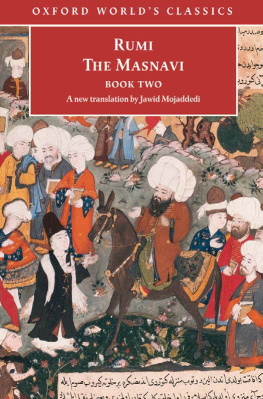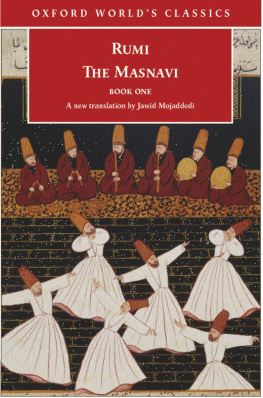PENGUIN  CLASSICS
CLASSICS
SPIRITUAL VERSES
MOWLN JALLODDIN BALKHI , known to the West as RUMI , was an Iranian poet of a status in Muslim civilization comparable to the greatest poets of European culture. For over 700 years he has been famed throughout the Muslim world as one of the greatest spiritual teachers of all time, and is affectionately known as Mowln (Turkish Mevlana) Our Master, or Mowlavi Learned Divine. He was born in 1207 in a small town near Balkh, in the north-east of present-day Iran, but his family fled the advancing Mongol hordes of Genghis Khan, who by 1220 had devastated Balkh and Samarqand, the cities of Rumis childhood. Around 1216 his family took him more than 2,000 miles westwards, settling eventually in Anatolia, a province that was still known as Rum (Rome/Byzantium), as it had only recently been conquered by the Muslim Seljuqs. Rumis name therefore spans cultures and continents. Rumis father, Bahoddin Valad, established himself as a religious scholar in Konya, the Seljuq capital of Rum.
Apart from his years spent studying in Aleppo and Damascus, Rumi remained in Konya for most of the rest of his life. Like his father, he was educated in all the religious sciences and became a scholar of a spiritual, Sufi, leaning. In his late thirties he began a profound transformation as a result of meeting a spiritual master called Shamsoddin of Tabriz, who arrived in Konya in 1244. This powerful and highly enigmatic teacher stimulated a spiritual and poetic development in Rumi until his death in 1273, though Shamsoddin himself disappeared mysteriously some twenty-five years earlier, around 1248. Near the time of their first meeting, Rumi began the composition of a body of sublime lyric poems, totalling 35,000 lines. In his later years he turned to the composition of the six volumes of his mystical masterpiece, the Masnavi-ye Manavi Spiritual Verses, a poem of epic proportions that is also one of the most personal and intimate works of spiritual teaching.
Rumi is also loved as a saintly teacher. Following his teachings, his disciples formed the Mevlevi Sufi order, best known in the West for its practice of the sema ; the ritual practice of audition to music and accompanying whirling dance of the Mevlevi dervishes. It is in the poetry of the Masnavi , however, that we find the living teaching and insight of a prodigious and unrivalled spiritual understanding. ALAN WILLIAMS was born in 1953 in Windsor, Berkshire, England. He was educated at Dulwich College, London and The Queens College, Oxford, where he studied Classics, then Persian and Arabic, followed by a doctorate in Old and Middle Iranian Studies and Zoroastrianism at the School of Oriental and African Studies, University of London, where he has also taught. He was Lecturer in Religious Studies at the University of Sussex and is now Senior Lecturer in Comparative Religion at the University of Manchester, specializing in Iranian studies.
His research has resulted in several books and articles on Iranian studies, the history of religions, comparative literature and translation studies.
RUMI
Spiritual Verses
The First Book of the
Masnavi-ye Manavi
Translated with an Introduction and Notes by
ALAN WILLIAMS
PENGUIN BOOKS PENGUIN CLASSICS Published by the Penguin Group
Penguin Books Ltd, 80 Strand, London WC2R 0RL , England
Penguin Group (USA) Inc., 375 Hudson Street, New York, New York 10014, USA
Penguin Group (Canada), 90 Eglinton Avenue East, Suite 700, Toronto, Ontario, Canada M4P 2Y3
(a division of Pearson Penguin Canada Inc.)
Penguin Ireland, 25 St Stephens Green, Dublin 2, Ireland
(a division of Penguin Books Ltd)
Penguin Group (Australia), 250 Camberwell Road, Camberwell, Victoria 3124, Australia
(a division of Pearson Australia Group Pty Ltd)
Penguin Books India Pvt Ltd, 11 Community Centre, Panchsheel Park, New Delhi 110 017, India
Penguin Group (NZ), 67 Apollo Drive, Mairangi Bay, Auckland 1310, New Zealand
(a division of Pearson New Zealand Ltd)
Penguin Books (South Africa) (Pty) Ltd, 24 Sturdee Avenue, Rosebank, Johannesburg 2196, South Africa Penguin Books Ltd, Registered Offices: 80 Strand, London WC2R 0RL , England This translation first published in Penguin Classics 1006
3 Copyright Alan Williams, 2006
All rights reserved The moral right of the translator has been asserted Except in the United States of America, this book is sold subject to the condition that it shall not, by way of trade or otherwise, be lent, re-sold, hired out, or otherwise circulated without the publishers prior consent in any form of binding or cover other than that in which it is published and without a similar condition including this condition being imposed on the subsequent purchaser ISBN: 9781101491690
Acknowledgements
Though Rumis Masnavi is vast in scale, it is one of the most personal poems ever written. It is a revolution against imprisonment in personality and against estrangement from our true selves. I first encountered the Masnavi more than thirty-five years ago, in Reynold Alleyne Nicholsons (London, 192340) translation. It was an experience of entrancement but also perplexity. What poetry lay in the Persian, behind Nicholsons highly literal, prose, version? I ended up switching from an undergraduate degree in Classics to the study of Persian and Arabic language and literature.
Now I could read the Masnavi in Persian, I saw just how much of the original is lost in prose translation. It was only later, in the experience of trying to teach students how the poetry of Rumi works , that I began to wish to do my own metrical English translations of the Masnavi . Initially I was asked by my editor to translate the entire work: I pointed out that that would be a long time in preparation. I resisted the idea of anthologizing: this has been done before, and, more importantly, what is lost in such story-based anthologies is the coherence of the didactic structure. So I translated the first book as faithfully as possible, and at the same time into a poetic form, namely iambic-pentameter couplets of blank verse. I have tried to keep faith both with the Persian language and with the poetic integrity of the couplet form.
This first book of the Masnavi is the key to understanding the whole work. Nobody who translates the Masnavi can step out of the long shadow cast by Nicholsons monumental work of scholarship. However, readers often find his translation difficult to understand because of its archaic language and difficult phrasing; moreover his literalness in explaining the letter of the text in prose loses the poetic coherence and power that drive the Masnavi forward and hold the readers attention. Though a great deal has been written about Rumi over the last hundred years, and about his ideas in the greater context of Sufism, to date there has been little written in European languages about the actual poetry of the Masnavi. Scholars have laboured to translate this and other Sufi classics, but very little analytical work has been done on the literary and linguistic form of the texts. Such is the reverence many readers have for Rumi that in some cases what are intended as serious academic studies are in fact more celebrations than elucidations.
This is not a new phenomenon, as for many centuries a devotional culture has surrounded the figure of Rumi: he has been seen, especially outside Iran, as a saintly sheikh at the centre of the Mevlevi tradition rather than as a poet whose works could be thought about. There are signs that this is about to change. Rumi is both a poet and a mystic, but he is a teacher first, trying to communicate what he knows to his audience. Like all good teachers, he trusts that ultimately, when the means to go any further fail him and his voice falls silent, his students will have learnt to understand on their own. In reading the text with my students, and in reading my translations out to listeners, I began to engage with the structures of Rumis method of communication and his poetic voice in a way that went beyond merely studying the original text privately. I was particularly fortunate to benefit from working with a master of the Persian nay (flute) and voice, Ostad Hosayn Omoumi, in a recitation of the Masnavi and musical performance in London in 2002 an experience that made me realize that any translation must be worth reading aloud! I am deeply indebted to him, and also to the many students with whom I have read the Masnavi at the University of Manchester over the years.











 CLASSICS
CLASSICS